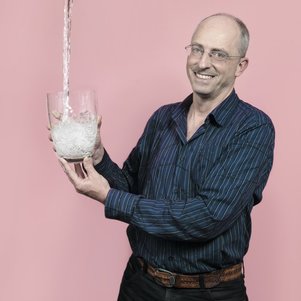Mark van Loosdrecht wins Novozymes Prize for 25 years of revolutionary wastewater treatment
The development of new technologies for biological wastewater treatment is turning our view of sludge upside down. Microbiologist Mark van Loosdrecht receives the 2022 Novozymes Prize for his pioneering work in copying and reusing nature’s mechanisms in wastewater treatment and resource recovery. Van Loosdrecht: “Treating wastewater will become good business in the future.”
For decades, the focus in wastewater treatment has primarily been on developing even better physical and chemical methods but Mark van Loosdrecht, Professor in Environmental Biotechnology at TU Delft, has focused on the biological aspects – and with great success: throughout the last 25 years, Van Loosdrecht and his team developed a series of new wastewater treatment processes, taking advantage of nature’s own principles in wastewater treatment and resource recovery. For his outstanding contributions to wastewater treatment Mark van Loosdrecht is being awarded the 2022 Novozymes Prize.
The Novozymes Prize, awarded by the Novo Nordisk Foundation, recognises outstanding research or technology contributions that benefit the development of biotechnological science for innovative solutions. The Novo Nordisk Foundation is an interdisciplinary research centre that develops new knowledge and technology for the production of sustainable bio-chemicals. Van Loosdrecht will receive the Novozymes Prize, which is accompanied by DKK 5 million (ca 672.000 euro), in a ceremony in Bagsværd, Denmark, on 1st of April.
Research that revolutionised wastewater treatment worldwide
Bernard Henrissat, Chair of the Committee on the Novozymes Prize, says: “Professor Mark van Loosdrecht’s achievements have had an enormous impact in environmental biotechnology. He has developed biological processes which could efficiently remove environmental pollutants, and full-scale reactors based on Mark’s research and design are in operation or under construction on almost all continents. His innovations and inventions have revolutionised wastewater treatment and resource recovery, and he is a very deserving recipient of the 2022 Novozymes Prize.”
The purpose of Van Loosdrecht’s work is to create healthier natural water ecosystem, a more sustainable circular economy and better balance in nature for the benefits of millions of people all over the world. Van Loosdrecht: “I try to understand the bacteria and their interactions and, with their help, try to recover all the valuable nutrients from the wastewater. Wastewater treatment can become good business rather than an increasing expense for countries globally. I am grateful and honoured to be receiving the Novozymes Prize.”
25 years of new wastewater treatment processes
Today, only about two thirds of the world’s population are guaranteed clean drinking-water. Fortunately, this percentage is rising. However, global challenges such as pollution from chemicals, droughts and floods and increasing urbanisation are threatening this trend, as well as lack of investment in wastewater treatment. The demand for water has never been greater, and water has therefore never been higher on the political agenda.
Mark van Loosdrecht started developing water and wastewater treatment processes at Delft University of Technology in 1988. The discharge of phosphates into surface water leads to eutrophication and blooming of algae, which was a huge problem at the time. In 1998, the BCFS® process became the first of a series of new wastewater treatment processes developed by van Loosdrecht and his team. This was followed by the development of the SHARON process which combined with the ANAMMOX® process help convert nitrogen-containing compounds and avoiding emission of nitrous oxide, an extremely potent greenhouse gas.
In the following years, while SHARON and ANAMMOX® plants were implemented worldwide, Mark van Loosdrecht took wastewater treatment to the next level by studying other natural microbial processes in sludge. He converted activated sludge into small granules containing various layers of phosphate-removing bacteria, which settled much faster than conventional sludge. The researchers dubbed the technology Nereda® – derived from the Nereids, mythical Greek water nymphs. By analysing the Nerada® granules, Van Loosdrecht’s team discovered several substances with a possible market potential such as Kaumera Nerada® Gum, a sustainable biopolymer. Van Loosdrecht has won the prestigious Spinoza Prize for his research in 2014.

Mark van Loosdrecht
Full professor, Section Leader
- +31 15 2781618
- M.C.M.vanLoosdrecht@tudelft.nl
-
Room: B58. C2.190